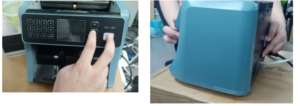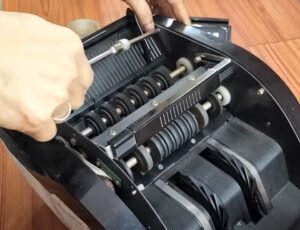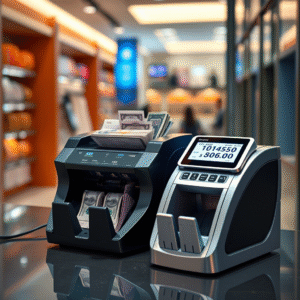Besoin d'une machine à compter l'argent près de chez vous ? Ce guide explique l'importance d'une manipulation précise de l'argent liquide, les différents types de compteuses et comment trouver les meilleures options locales pour votre entreprise, du commerce de détail à la restauration, en passant par les associations. Nous aborderons les principales caractéristiques à prendre en compte et répondrons aux questions fréquentes pour vous aider à prendre une décision éclairée.
Pourquoi s'embêter avec une machine à compter l'argent ?
Bon, soyons réalistes. Compter l'argent à la main ? C'est pénible. C'est lent, sujet aux erreurs (nous sommes tous humains !) et ça fait perdre un temps précieux. Imaginez : vos employés pourraient se concentrer sur le service client, la gestion des stocks, ou, vous savez, fabrication de l'argent au lieu de passer des heures à trier les factures.
Une machine à compter l'argent n'est pas seulement pratique ; c'est un investissement en termes de précision et d'efficacité. Des erreurs de comptage peuvent entraîner des écarts dans vos comptes, qui peuvent engendrer des problèmes plus importants par la suite. De plus, dans les secteurs qui gèrent un volume important d'argent liquide, comme le commerce de détail, la restauration ou même certaines associations, le gain de temps à lui seul peut justifier le coût.
Mais lequel vous convient le mieux ? Voyons les différentes options et comment les trouver à proximité.

Décryptage du paysage des machines à compter l'argent
Il existe une gamme étonnamment large de machines à compter l'argent, chacune conçue pour répondre à des besoins et des budgets différents. Voici un bref aperçu :
- Compteurs de billets de base : Ce sont les modèles les plus simples, conçus pour compter le nombre total de billets. Ils sont parfaits pour les petites entreprises ou les situations où vous devez principalement vérifier la quantité d'argent liquide.
- Compteurs de valeur : Ces méthodes vont plus loin en additionnant la valeur totale des billets. Elles nécessitent souvent de trier les billets par valeur nominale au préalable, mais elles permettent de gagner beaucoup de temps par rapport au calcul manuel.
- Compteurs de dénominations mixtes : Ce sont des outils performants. Ils peuvent compter des piles de billets mélangées et calculer automatiquement leur valeur totale. Ils sont parfaits pour les entreprises qui gèrent beaucoup d'argent liquide et doivent rapprocher les dépôts rapidement et avec précision.
- Compteurs de pièces : N'oubliez pas la monnaie ! Les compteuses trient et comptent les pièces, vous évitant ainsi la tâche fastidieuse de les rouler à la main. Certains modèles emballent même les pièces pour vous.
- Détection de contrefaçon : De nombreuses machines à compter l'argent modernes sont équipées de fonctions de détection de faux billets, utilisant des capteurs UV, magnétiques et infrarouges pour identifier les faux billets. Cette fonctionnalité est essentielle pour protéger votre entreprise contre la fraude.
Le type de compteur le plus adapté à vos besoins dépend entièrement de vos besoins spécifiques. Un petit café peut se contenter d'un compteur de billets basique, tandis qu'une épicerie très fréquentée aura probablement besoin d'un compteur multi-valeurs avec détection de contrefaçon.
Voici un tableau résumant les fonctionnalités et les cas d’utilisation commerciale typiques :
| Type de machine | Caractéristiques principales | Cas d'utilisation commerciale typiques |
|---|---|---|
| Compteur de billets de base | Compte le nombre de billets, opération simple | Petits commerces de détail, cafés, entreprises à faible volume de trésorerie |
| Compteur de valeur | Compte la valeur des billets (triés par dénomination) | Restaurants, petites entreprises avec un volume de trésorerie modéré |
| Compteur de dénominations mixtes | Compte la valeur des billets mélangés, détection des contrefaçons | Épiceries, stations-service, grands magasins de détail, banques |
| Compteur de pièces | Trie et compte les pièces | Arcades, laveries automatiques, toute entreprise avec un volume de pièces élevé |
Trouver une machine à compter l'argent à proximité : vos options locales
Bon, vous savez maintenant de quel type de machine vous avez besoin. Maintenant, comment en trouver une près de chez vous ? Voici un aperçu des options qui s'offrent à vous :
- Magasins de fournitures de bureau : Staples, Office Depot et autres magasins similaires proposent souvent une sélection de machines à compter l'argent, allant des modèles les plus basiques aux plus sophistiqués. L'avantage est que vous pouvez voir les machines en personne et discuter avec un commercial.
- Concessionnaires d'équipements commerciaux : Ces revendeurs spécialisés proposent souvent une gamme plus large de machines à compter l'argent, notamment des modèles haut de gamme dotés de fonctionnalités avancées. Ils peuvent également fournir des conseils et une assistance d'expert.
- Détaillants en ligne




